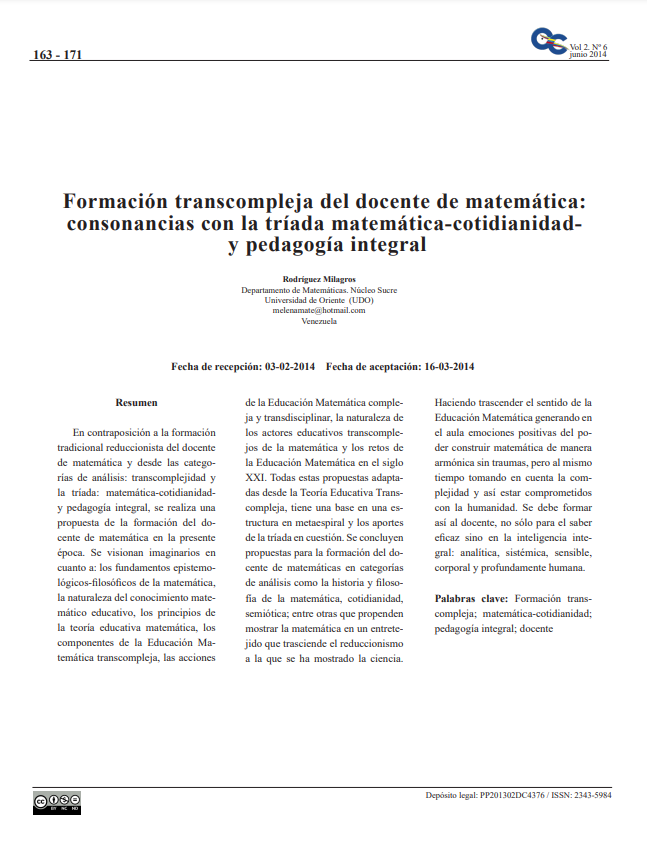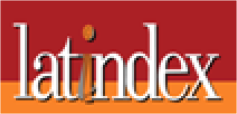Transcompleja formation of the teacher of mathematics: consonances with the triad mathematica-cotidianidad- y pedagogia integral
Keywords:
Transcompleja formation, mathematics-everydayness, integral pedagogy, teachinAbstract
In contrast to the traditional reductionist formation of the teacher of mathematics and from the categories of analysis: transcomplexity and the triad: mathematics - everydayness - and integral pedagogy, a proposal of the teacher's training in mathematics is made in the present time. Imaginary are envisioned in terms of: the epistemological-philosophical foundations of mathematics, the nature of mathematical educational knowledge, the principles of mathematical educational theory, the components of the Transcomplexed Mathematical Education, the actions of the complex and transdisciplinary Mathematical Education, the nature of the transcomplex educational actors of mathematics and the challenges of Mathematical Education in the 21st century.
Downloads
References
Freire, P. (1972). La educación como práctica de la libertad. México, México: Siglo XXI.
Gardner, H. (1995). Inteligencias múltiples. La teoría en la práctica. Barcelona, España: Paidós.
Giroux, H. (1990). Los profesores como intelectuales: Hacia una pedagogía crítica del aprendizaje. Barcelona, España: Piados.
Godino, J.; Batanero, C. (1998). The dialectic relationships amory theory, ddevelopment and practice in Mathematics Education: a meta análisis of theree investigations. En Malara, N. A. 1998:13-22.
González, J. (2004). Bases de la Teoría Educativa Transcompleja. Un camino emergente de la Educación, [en línea], de http://www.cea.ucr.ac.cr/ catedrau/attachments/078_Bases%20 de%20la%20Teoria%20Educativa%20 Transcompleja%20Dr.Gonzalez.pdf
Guerrero, O. (2007). Teoría Crítica y Educación Matemática. Revista Evaluación e Investigación 2(1): 24-41.
Morín, E. (1998). Introducción al pensamiento complejo. Madrid, España: Gedisa.
Morín, E. (1999). Los siete saberes necesarios para la educación del futuro. Caracas, Venezuela: UNESCO, FACES-UCV. CIPOST.
Morín, E. (2003). El método II. La vida de la vida. Madrid, España: Cátedra.
Morín, E. (2004). Unir los conocimientos. La Paz: Bolivia.
Morín, E. (2006). El método IV. Ética. Madrid, España: Cátedra.
Nicolescu, B. (2002). Manifesto of Transdisciplinarity. Albany: State University of New York.
Pérez, E. (2003). Para pensar en la formación del docente venezolano del siglo XXI. Revista de Teoría y Didáctica de las Ciencias Sociales 8: 189-208.
Rodríguez, M. (2010b). Matemática, Cotidianidad y Pedagogía Integral: Elementos Epistemológicos en la Relación Ciencia-Vida, en el Clima Cultural del Presente. Tesis Doctoral. Universidad Nacional Experimental Politécnica de la Fuerza Armada. Caracas, Venezuela.
Rodríguez, M. (2011ª). Pedagogía integral: ruptura con la tradicionalidad del proceso de enseñanza de la matemática. Aletheia. Revista de Desarrollo, Humano, Educativo y Social Contemporaneo 3 (2): 1-16.
Rodríguez, M. (2011b). La ética en la praxis de la tríada: matemática – cotidianidad – y pedagogía integral. Revista Educación y Desarrollo Social 5(1): 175-184.
Rodríguez, M. 2010a. El papel de la escuela y el docente en el contexto de los cambios devenidos de la praxis del binomio matemática-cotidianidad. UNIÓN. Revista Iberoamericana de Educación Matemática 21: 113-125.
Rodríguez, M. 2010c. Matemática, cotidianidad y pedagogía integral: tendencias oferentes desde una óptica humanista integral. Revista Electrónica Interuniversitaria de Formación del Profesorado 13: 105-112.
Schavino, N.; Villegas, C.(2006). El Paradigma Integrador Transcomplejo. En ensayos de investigaciones. Maracay, Venezuela. Publicación del centro de investigación de Postgrado de la Universidad Bicentenaria de Aragua.
Scheler, M. (2000). El formalismo en la ética y la ética material de los valores. Madrid, España: Caparrós.
Scheler, M. 2001. Ética: nuevo ensayo de fundamentación de un personalismo ético. Madrid, España: Caparrós.
Steiner, H. (1985). Theory of Mathematics Education (TME) An Introduction. For the Lerning of Mathematics 5(2): 11-17.
Tadeo, J. (2005). Fundamentos Epistemológicos para la Educación más allá de la Postmodernidad. Educar para la Trascendencia. Revista Anthropos Venezuela 50/51: 59-71.

Downloads
Published
How to Cite
Issue
Section
License

This work is licensed under a Creative Commons Attribution-NoDerivatives 4.0 International License.







